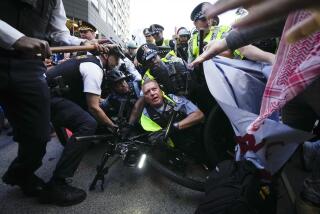Refuseniks Protest, Soviet Police Just Watch
- Share via
MOSCOW — More than 100 Jewish refuseniks took part Thursday in a forbidden public protest only a block from the Kremlin. Soviet police, showing unusual restraint, did not interfere.
The demonstration, one of the largest in recent years, coincided with a visit by members of the International Helsinki Federation, a Vienna-based organization that unites 13 national human rights groups monitoring the 1975 Helsinki accords.
Participants raised banners and signs and chanted slogans appealing for permission to emigrate. Several said they had been waiting 12 years or more for approval of their applications to leave.
A Canadian member of the Helsinki group, Irwin Cotler, a professor of law, joined the demonstrators.
Under a Moscow City Council regulation, demonstrations are forbidden unless an official permit has been obtained. Several refuseniks said no permit had been sought.
Police normally break up forbidden demonstrations within minutes, often arresting participants. On Thursday, however, uniformed police and plainclothes agents merely stood by and watched.
Western diplomats said the Soviet authorities do not want to crack down on public protests while the human rights observers are in Moscow to consult with Soviet officials. Also, the Soviet Union is trying to get international agreement on a human rights conference in Moscow, and a public crackdown on demonstrators would not help.
The refuseniks--men, women and children--assembled on a square in front of the Lenin Library for about an hour, even though the temperature at midday was 5 degrees below zero.
Jewish emigration increased to more than 8,000 last year, from fewer than 1,000 in 1986, yet many refuseniks said they are being denied exit visas on grounds--invalid, they say--of state security.
Meanwhile, members of the International Helsinki Federation continued to meet with Soviet officials, among them Konstantin Kharchev, chairman of the Council for Religious Affairs, and Deputy Foreign Minister Anatoly L. Adamishin of the Human Rights Section.
Earlier the group met with officials from the Justice Ministry, the Health Ministry and the internal police.
“The discussions in Moscow show the possibility of transition from confrontation to cooperation in the field of human rights,” Gennady I. Gerasimov, the principal Foreign Ministry spokesman, told reporters.
More to Read
Sign up for Essential California
The most important California stories and recommendations in your inbox every morning.
You may occasionally receive promotional content from the Los Angeles Times.













